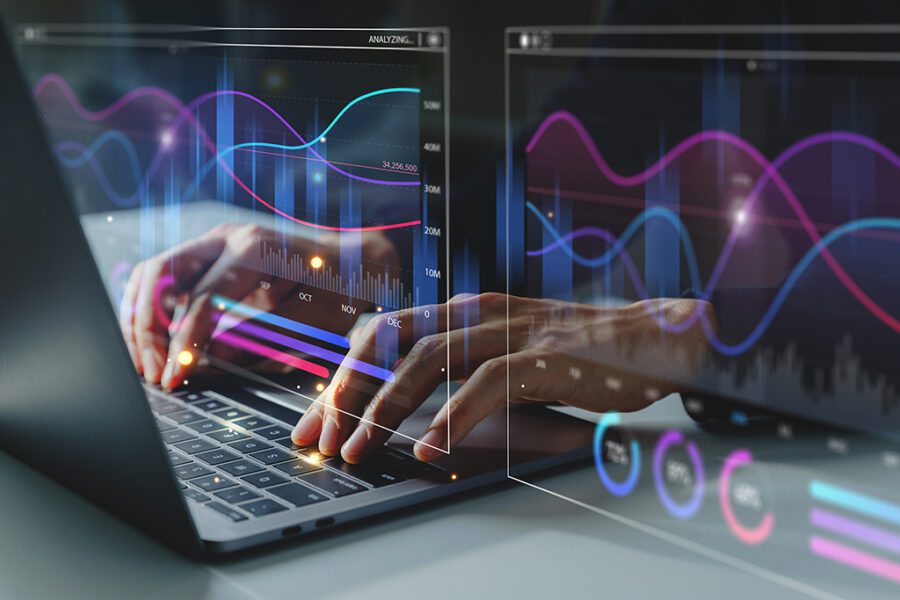
Artificial Intelligence (AI) has become crucial to highly demanding industries globally. The impact of AI in the accounting and finance industry is phenomenal, and it is also innovating how they operate and build products and services. Recent AI advancements are rapidly changing the face of accounting and finance in many ways.
Labor and time-consuming tasks of finance and accounting, which include – audits, banking, tax preparation, bookkeeping, reporting, and payroll, have become successfully automated with the help of AI. With the implementation of emerging technologies to develop self-learning systems also getting integrated into accounting works, technological systems will carry on repetitive and time-intensive tasks, which will leave the analytical and managerial tasks to humans. From chatbots to actively handling the management accountant, from facing the regulations and requirements from clients to handling the time-consumed tasks, AI has a huge impact.
According to Forbes, several reputed software vendors, such as Intuit, Sage, OneUp, and Xero, provide automated data entry and reconciliation options via Artificial Intelligence (AI) and Machine Learning (ML) technologies in organization bookkeeping. This has resulted in Chartered Professional Accountant professionals choosing a new kind of workforce so that they can well manage all the tasks without any hassles.
In this article, let’s dive deeper and understand how AI in accounting and finance is gathering a significant impact.
According to a study by the IMA, one-third of accounting firms spend anywhere from 51 percent to 75 percent of their time on repetitive, low-value tasks. Additionally, 56 percent of the surveyed accounting professionals said they require automation just to keep up with their growing workloads.
The digital transformation of accounting was very much required because many individuals in the accounting and finance industry are facing issues like handling day-to-day tasks. This resulted in actively adopting AI and ML platforms, which streamline the accounting processes and help the professionals speed up the work.
For example, the use of Robotic Process Automation (RPA) to decrease the processing times for audits and contracts down to weeks, which usually takes months — According to the CPA Journal. As Forbes explains, major firms adopting RPA AI integration have “high efficiency and higher-level services” compared with smaller, non-AI competitors.
Advantages of AI in accounting and finance
AI is developed on algorithms that improve over time as they are fed more data. In addition to continuous improvement, AI won’t have any type of human error and has an around-the-clock capacity to work without rest.
Accounting and finance firms can reap benefits from AI and ML platforms on the following three fronts:
- Invisible accounting
They can clearly understand behind-the-scenes operations that frees up the accountants to engage more with strategic decision-making procedures.
- Continuous auditing
Using auditing without breaks and also without gaps in logic or precision
- Active insight
Accounting managers and leaders can get real-time visibility and a better picture of their financials without any errors.
The impact of AI on the accounting and finance industry
The finance and accounting industry has moved from basic financial reporting, and payroll to the other paradigms that are taking an active role in forward-thinking businesses. The adoption of AI accounting software that leverages several tasks by automating accounting tasks, which are of less value and are repeatable offer the professionals more time to contribute to properly plan things and work towards the company’s growth.
Change is the only real constant factor that remains in any business. From mitigating the business to adopting the new operational methods, many Chartered Professional Accountants individuals are looking for ways to effectively manage the transformations in the business, especially by driving the latest technologies.
- Closing Procedures
The sooner one gets the numbers, the more time an organization will have to develop strategies for the procedure with the numbers. AI in accounting and finance
Provide the accountants with management data from many sources, consolidate and merge it. This will result in speeding up the quarterly, and monthly closing procedures but also gives more accuracy because AI is involved.
- Payable & Receivable Accounts
The present system has an AI-enables invoice management process that can make Chartered Professional Accountants in management to process the payable/receivable works more streamlined by using the digital workflow. They can also manage and learn the accounting code for the invoice.
- Audit
Digitalization tracks the file and gives clear insights into which person, at what time,, and from which location has accessed it. This gives more security to data and files. At the time of an audit, auditors are not required to search file cabinets for documentation as they can quickly and easily have access to digital files. This, in turn, maximizes the accuracy and efficiency of audits and makes it easy to audit 100 percent of a firm’s financial transactions, not just mere samples.
End Notes
AI can often provide real-time status of financial issues since it can process documents using Natural Language Processing (NLP) and computer vision better and quicker than ever, making daily reporting possible and inexpensive. This insight gives accounting and finance firms to be proactive and adjust if the data show unfavorable trends.
